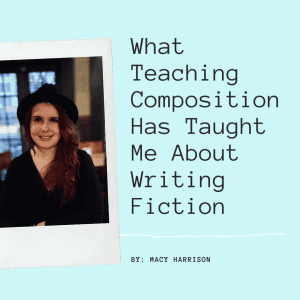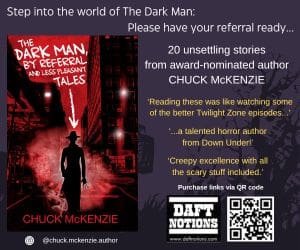What Teaching Composition Has Taught Me About Writing Fiction
 What Teaching Composition Has Taught Me About Writing Fiction
What Teaching Composition Has Taught Me About Writing Fiction
By: Macy Harrison
When I left graduate school, I thought I knew a lot about reading and writing literature. After all, I had a fancy slab of vellum that said as much, right? That confidence spurred me on as I applied for my first solo teaching job at my local community college, carried me through the interview, and followed me about up until the time I first set foot in the classroom that was to be mine, and mine alone. That was when the bottom fell out of the bucket.
Okay. Maybe that’s a little dramatic (sometimes it’s hard to turn off that old story-telling feature in the brain). My point is that I, like many fresh-out-of-college teachers, realized that I hadn’t actually thought about basic composition skills in a while, graduate school having taken me further and further into the realms of high conception, as opposed to fundamental knowledge. What was I supposed to tell the twenty-five faces peering up at me from their desks? Okay, class, today we’re going to discuss Barthes’ conception of semiology and how it relates to a post-postmodern world? Obviously, that wasn’t going to fly (though, regrettably, I’ve noticed the tendency for some first time higher ed teachers to do just that—but that’s an article for a different day).
In order to teach my students the basic composition skills they will need to carry them through higher level classes, I had to essentially relearn them myself. Doing so has not only given me a new perspective on how people, especially younger people, interact with reading and writing, but it has also enabled me to think more deeply about my own writing, and about the choices that I as a writer make. Sometimes it helps to get back to basics.
The following are some of the most integral lessons I teach my students. Though originally conceived to help them compose college-level essays, I have found that these guidelines are also applicable to fiction writing, and adhering to them has helped me to become a stronger writer and a more conscientious reader.
#1: It’s okay not to know where you’re going, but you should know how you’re getting there (more or less)
Whether it be an essay or a work of fiction, we don’t always know how we’re going to end things—and that’s okay. If the ending surprises even us, then surely it will surprise the reader. Not knowing how you’re going to get to that ending, however, is a different matter. If you want your writing to be tight, as opposed to a meandering mess, then you would do well to begin with an outline, even if it’s a loose one.
Now, unless you’re writing an incredibly intricate novel with many time lines, perspectives, etc., in which case a detailed outline is needed to prevent confusion, I’m not a big fan of minutely-plotted outlines for fiction, as they can result in a story that is so tight it doesn’t have good flow or room for surprises. I am a fan of having a basic plan in place, one which you’re not married to, and can deviate from as needed. Doing so can help stave off the dreaded writer’s block since, if you do get stuck, you can always skip over the problem section and return to it later, after you’ve written the next scene.
On this same note, it’s important to start off with a good idea of why you’re writing what you’re writing. What themes do you want to discuss? Is there some larger point you’d like to make with your story? Deciding on these things early on can help give you a clearer perspective on what needs to happen in your narrative, and when.
#2 In the end is the beginning
The beginning can be one of the most challenging parts of any writing project. It’s your first point of contact with the reader—you want it to be good. But if you overthink it, you’re liable to end up with an intro that is overwrought and wooden. That is why I suggest saving the beginning for the end. The beginning should be the last thing you write.
Oftentimes, when we start off writing, we only have a fuzzy idea of what our story is about, and how our characters are going to react to whatever it is we’re about to throw at them. By the time you type “The End” on your first draft, most of that fuzziness should have subsided. Once you have that clearer view of your story and what it’s about, go back and rewrite the intro. It’s much easier to craft a beginning that introduces your characters, setting, and storyline in an interesting and thematically relevant way once you know how your story ends.
#3 Research, research, research
Notice how, in the acknowledgement sections of novels, authors are always thanking the scholars and museum staff who helped with their research? That should tell you a thing or two about research, namely that it’s a long, involved process that often necessitates help from others. This means that, while Wikipedia might be useful for looking up minor details, it better not be your only source for information.
Read at least a few books on your subject. Watch a documentary or two. Make a contact at your local university or museum who specializes in your subject. Look at many different sources, including the bad ones, as they can show you what not to do.
But what, you may ask, if your novel is set in an entirely fantastical place and time? Sorry, that doesn’t absolve you from research. In fact, you may even need to do extra research to ensure your fantasy realm is believable, for even fantasy realms must abide by some laws of nature and physics. For instance, what might your realm’s plants and animals look like given the climate? Or, how might your society’s social and political norms affect the technology it has developed? You’d need to research both these things (and plenty more) to get a good idea of how to proceed when building your world.
Why bother with any of this? Well, for one, because it’s really embarrassing when someone points out something you got wrong. I’ve been around academics enough to know that, if they come across a novel that has something to do with their specific research area, then there’s a very good chance that they’ll pick that novel up to see how it stacks up against their expertise. So in other words, while you may not be an expert on gender roles in feudal Japan, you can be damn sure that at least one or two of your readers will be—and that they’re liable to call you out if you get something wrong.
What’s more, I feel that, especially here in the era of fake news, we owe it to both our subject and our readers to get the facts correct. And the only way to ensure you get your facts correct is to research, research, research. (Besides, it’s fun to learn new things!)
#4 Know the rules before you break them
Sometimes, it can feel like editors are only interested in the really out there, experimental stories that are unlike anything anyone’s seen before. This fear of inadequacy has led many a writer to run before learning how to walk, resulting in stories that think they’re profound, but are really just messy. I know you’ve heard it before, but it bears repeating: you need to know (and understand) the rules before you break them.
At its most basic, this means you need to have mastered the basics of style, form, and grammar before you start playing around with any of them. You think James Joyce came out of the womb knowing how to write like that? Nope. He got that way by mastering the fundamentals and then experimenting with what he had learned.
In a higher order sense, this means you also need to know—and be able to reproduce—the standards of your genre before you can produce anything new. So don’t fret that your stories are too basic bitch. Every writer starts off writing stories that use the common tropes of their given genre. Once you’ve mastered the basic tropes, and can write a decent narrative, even if it is somewhat cliché, then you can start playing around and trying new techniques.
#5 Formatting matters
Here’s a life lesson: if someone can’t be bothered to get the basics right, then don’t expect them to get the big things right, either. Editors know this. That’s why they tend to delete, unread, stories that don’t follow their formatting guidelines—because they know that writers who can’t be bothered to follow simple formatting requests probably haven’t bothered to put much time or effort into their stories. Furthermore, editors don’t have time to fix your formatting so that it works with their editing software. So check, and double check, any and all formatting guidelines before hitting submit. Sometimes formatting is the only basis for accepting one story and rejecting another.
#6 Accept criticism and don’t let it kill your drive
One of the toughest things to overcome as a composition teacher is the tendency for people to take any criticism of their writing really personally. Many writers tend to take any criticism as a personal attack. Guess what? It’s probably not. Everyone gets criticized, even bestselling authors. Remember that writing is a learned skill, and, like any other learned skill, everyone, even those who are already competent, has room for improvement. That’s why you should listen to criticism, especially when it’s given by an editor, or other publishing professional. Chances are, they’ve been around the block enough times to know what’s what better than you do.
Equally important: don’t let criticism (or rejection, for that matter) kill your drive. Don’t think of criticism as someone saying your work isn’t good enough—think of it as someone saying your work is good enough to keep tweaking it until it’s perfect. Likewise, don’t view rejection as someone saying never gonna happen; see it as an editor saying not yet.
Final Notes
As an author, composition teacher, and writing tutor, I spend a significant portion of my time writing and thinking about writing. That doesn’t mean there’s nothing new for me to learn—in fact, one of the things I enjoy most about writing is that I’m always learning something new, be it about the craft itself, or about whatever subject I’m treating that day. If you nurture that spirit of curiosity, and always keep yourself open to new knowledge and experiences, then your writing, and probably your life, too, will flourish.
I hope the above tips will serve you well, whether you’re brand-spanking new at this gig, or a vet. Always remember: writing is a process, a journey, not a destination. Other may speed past you, or lag behind, but know that, at all times, you’re exactly where you need to be on this road we share.
Author Bio
Macy Harrison
Macy Harrison is a dark fantasy and horror writer, English adjunct, and writing tutor based in Dallas, Texas. Her fiction has appeared in Novel Noctule and she is currently finishing up her first novel.
- About the Author
- Latest Posts
The Horror Tree is a resource for horror authors which was created in 2011. The main goal when starting the site was to include all of the latest horror anthologies and publishers that are taking paying submissions. A resource useful for both new and experienced publishers alike looking for an outlet for their written material!

 Author Bio
Author Bio








